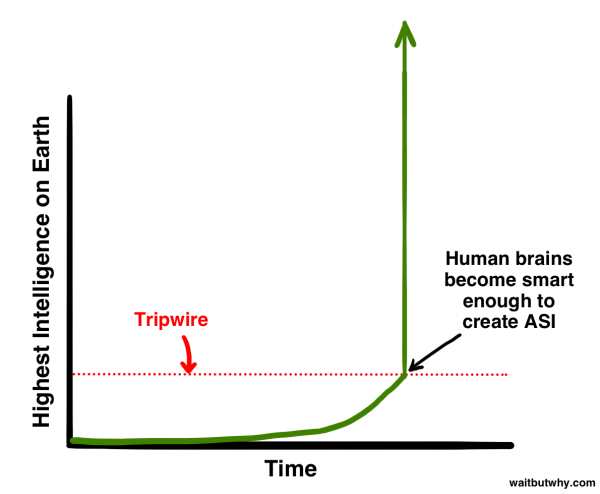Mar 13 2016
Do not pass Go! Why you should be concerned about Artificial Intelligence The 2500 year old game of Go has simple rules but profound complexity. Success requires masterful intuition and advanced pattern recognition skills. Masters of the game study since childhood. It is considered a much more complex challenge for computer scientists than chess.
The 2500 year old game of Go has simple rules but profound complexity. Success requires masterful intuition and advanced pattern recognition skills. Masters of the game study since childhood. It is considered a much more complex challenge for computer scientists than chess.
So it was a surprise to many this morning when the computer ‘AlphaGo’ defeated international champion Lee Se-Dol for the third time, winning a best of five tournament 3-0.
No-one was more taken aback than Lee, especially since he missed out on $1 million in prize money.
“I was very surprised,” says Lee. “I didn’t expect to lose. I didn’t think AlphaGo would play the game in such a perfect manner.”
AlphaGo made no comment. In fact it appeared disinterested in its astounding victory.
AlphaGo was developed by the British company DeepMind, which was acquired by Google 2 years ago.
The DeepMind team started out by training AlphaGo on 30 million expert moves. They then set it to work playing millions and millions of games against itself – tweaking and improving its judgement about the relative value of positions and moves each time.
As it gets more experience, it is getting better and better. Having taught itself to improve, it is now a much better player than the humans who created it. This is considered a big deal in AI circles.

Machines have now beaten humans in Chess, Jeopardy, Go and in the ultimate challenge – Donkey Kong.
Should we be celebrating the rise and rise of Artificial Intelligence?
Maybe not. Or at least not without some reservations.
Stephen Hawking says
“The development of full artificial intelligence could spell the end of the human race.”
Bill Gates says
“I am in the camp that is concerned about super intelligence … I don’t understand why some people are not concerned.”
Elon Musk says
“I think we should be very careful about artificial intelligence. If I were to guess like what our biggest existential threat is, it’s probably that…. With artificial intelligence we are summoning the demon.”
If these three are concerned, perhaps we should be paying attention.
Our favourite blogger Tim Urban has done an exhaustive two part piece on Artificial Intelligence in his blog ‘Wait But Why’.
In the article, he classifies AI into three types
- Artificial Narrow Intelligence
- Artificial General Intelligence
- Artificial Superintelligence
Artificial Narrow Intelligence, or ANI, is AI that specialises in a narrow task – like playing Go, or driving a car, or being Siri. As demonstrated again today by AlphaGo, machines can already perform many tasks better than humans.
Artificial General Intelligence, or AGI, refers to AI that’s at least as intellectually capable as a human, across the board. This is many orders of magnitude more complicated than narrow or task specific intelligence. It implies a great understanding of the physical and social world, a knowledge of world history, insight into the psychology of people, a deep grasp of context, and an ability to learn.
A machine with AGI would pass what is known as the Turing Test. In this test, a computer would participate in a conversation so convincingly that a human would not be able to tell if he or she were conversing with a man or machine. (Turing called this ‘The Imitation Game’)
Artificial General Intelligence is still many years away. However, with increases in computing power and ready access to the huge knowledge base that is the internet, most experts believe AGI will be achieved some time this century (Probably around 2040, but some believe as early as 2022)
What is Artificial Super Intelligence (ASI)? Oxford philosopher and leading AI thinker Nick Bostrom defines superintelligence as “an intellect that is much smarter than the best human brains in practically every field, including scientific creativity, general wisdom and social skills.”
A learning machine that achieves human-like intelligence (AGI) will be a great milestone. It will then be able to develop new ways of increasing its own computing capacity and new ways of learning that we humans hadn’t thought of. Just as AlphaGo started off as a fairly average Go player and taught itself to become the best player in the world, AGI may start off at Forrest Gump level, but very quickly , as it continues to learn, it will reach Albert Einstein level. Immediately after that it will be more intelligent than any human ever.
The path from human-like intelligence to super intelligence will be exponential. Some futurists believe that the time frame will be very very short. Some believe we will see progression from General Intelligence to Super Intelligence in a period of days to months!

The character played by Matt Damon in Good Will Hunting could intuitively solve mathematical problems that the greatest professors of mathematics had struggled with for years.

“Do you know how easy this is for me? Do you have any idea how easy this is? This is a joke. And I’m sorry you can’t do this. I really am because I wouldn’t have to sit here and watch you fumble around and stuff it up.” (multiple expletives deleted)
This is what superintelligence will be like when compared to us. But much more so.
It is envisaged that Artificial Superintelligence will solve major scientific questions such as the Universal Theory of Everything. It will find a cure for cancer. It will develop new agricultural and industrial techniques that will increase productivity and feed the world.
Stephen Hawkins, Bill Gates and Elon Musk have all made significant contributions to the development of Artificial Intelligence. They are among 150 scientists who have recently posted an open letter supporting AI research and expounding its benefits.
But they are also amongst those who are very concerned that perhaps in developing Artificial Intelligence we ‘are summoning the demon’.
They warn that with great intelligence comes great power.
A machine that is much much more intelligent than mankind will be much much more powerful than we are. AlphaGo doesn’t really care whether it beats Lee Se-Dol. Our future super intelligent machine may not really care about our future. Inadvertently, or ‘adverdently’, depending upon the motives of the individuals or organisation that first develops a super intelligent machine, the changes made by such a machine may lead to our extinction, just as our own development has lead to the extinction of many ‘less-intelligent’ animal species.
As Prof Weirdo found when creating Milton the monster, it is vital to get the recipe just right.
Six Drops of the essence of terror,
Five drops of sinister sauce
When the stirrings done may I lick the spoon?
Of course, ha ha, of course.
Now fir the tincture of tenderness, But I must use only a touch
For without a touch of tenderness, he might destroy me
Whoops – too much!
Tim Urban writes that there is no way to know what Artificial Super Intelligence will do or what the consequences will be for us. Will we be able to add enough of the tincture of tenderness?
Will AI lead to our immortality or to our extinction?
When the answer to a difficult problems is not clear, I find it is always good practice to give the final word to the Flight of the Conchords.


 RSS - Posts
RSS - Posts



Leave a Reply